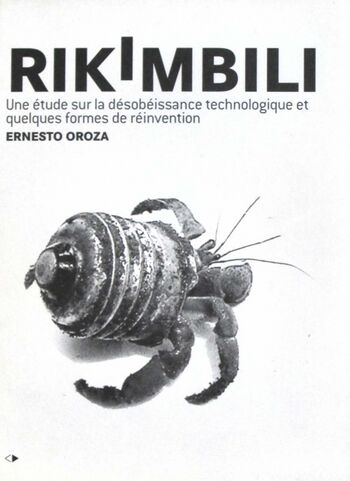Difference between revisions of "File:Oroza Ernesto Rikimbili une etude sur la desobeissance technologique et quelques formes de reinvention 2009.pdf"
(via Martino) |
|||
| (One intermediate revision by the same user not shown) | |||
| Line 1: | Line 1: | ||
| − | == | + | [[Image:Oroza_Ernesto_Rikimbili_une_etude_sur_la_desobeissance_technologique_et_quelques_formes_de_reinvention_2009.jpg|thumb|350px|link=File:Oroza_Ernesto_Rikimbili_une_etude_sur_la_desobeissance_technologique_et_quelques_formes_de_reinvention_2009.pdf]] |
| − | + | ||
| + | '''Rikimbili: une étude sur la désobéissance technologique et quelques formes de réinvention''' | ||
| + | |||
| + | by [[Ernesto Oroza]] | ||
| + | |||
| + | "Quand nous acceptons le critère bourgeois qui sanctionne la nécessité comme indigne et celui qui exprime ses besoins comme faible et vulgaire, nous participons à la réduction systématique de la créativité et de la liberté qui pourrait se traduire dans la culture contemporaine." (Ernesto Oroza) | ||
| + | |||
| + | “PLOUGHSHARES AS TECHNOLOGICAL DISOBEDIENCE (CUBA)<br> | ||
| + | Cite du design is a broad church. Whilst hordes of courtiers flocked around the Minister like starlings at sunset, copies of a subversive new book, by Ernesto Oroza, were being distributed by Cite’s publications team. Rikimbili – “a study of technological disobedience and other forms of re-invention” – describes how Cubans have adapted and recycled industrial objects during fifty years of US sanctions. The book’s title, Rikimbili, is named after a two-wheeled vehicle that started its life as a bicycle. The book is subversive because, for me anyway, it describes the kind of design we’ll be doing in the coming age of scarcity industrialism (a phrase of John Michael Greer). Design shows filled with shiny objects, by contrast, are best perceived as historical events about a pardigm that has passed. Write direct to obtain your copy of Rikimbili to: emilie.chabert at citedudesign dot com.” (John Thackara) | ||
| + | |||
| + | Publisher Publications de l'Université de Saint-Étienne, Saint-Étienne, 2009 | ||
| + | Translated by Nicole Marchand-Zanartu | ||
| + | French | ||
| + | ISBN 978-2-86272-527-7 | ||
| + | 67 pages | ||
| + | [[Media:Oroza Ernesto Rikimbili une etude sur la desobeissance technologique et quelques formes de reinvention 2009.pdf|PDF]] (8mb) | ||
| + | |||
| + | [https://www.youtube.com/watch?v=v-XS4aueDUg Video interview] (8 min, 2013). | ||
| + | [http://www.technologicaldisobedience.com/ Research blog] (est. 2016). | ||
| + | [https://www.ernestooroza.com/rikimbili-une-etude-sur-la-desobeissance-technologique-et-quelques-formes-de-reinvention-2009/ Author]. | ||
| + | [https://presses.univ-st-etienne.fr/fr/collections/arts-xx-xxi/anciennement-arts.html Publisher]. | ||
| + | |||
| + | ''See also'' | ||
| + | * Ernesto Oroza, [https://journals.openedition.org/tc/12320 "Subvertir la panne. De la réparation à la prophylaxie"], ''Techniques & culture'' 72: "En cas de panne", 2019, pp 108-125. {{fr}} | ||
| + | * Pénélope de Bozzi, Ernesto Oroza, ''[[Media:de Bozzi Penelope Oroza Ernesto Objets reinventes la Creation populaire a Cuba 2002.pdf|Objets réinventés: la création populaire à Cuba]]'', Paris: Alternatives, 2002, 125 pp. [https://www.ernestooroza.com/objets-reinventes-la-creation-populaire-a-cuba-2002/ Author]. [https://www.editionsalternatives.com/site.php?type=P&id=160 Publisher]. {{fr}} | ||
| + | |||
| + | ''[[Posted_on::2024-07-17]]'' | ||
| + | <noinclude> [[Series:Log]] </noinclude> | ||
Latest revision as of 22:29, 17 July 2024
Rikimbili: une étude sur la désobéissance technologique et quelques formes de réinvention
"Quand nous acceptons le critère bourgeois qui sanctionne la nécessité comme indigne et celui qui exprime ses besoins comme faible et vulgaire, nous participons à la réduction systématique de la créativité et de la liberté qui pourrait se traduire dans la culture contemporaine." (Ernesto Oroza)
“PLOUGHSHARES AS TECHNOLOGICAL DISOBEDIENCE (CUBA)
Cite du design is a broad church. Whilst hordes of courtiers flocked around the Minister like starlings at sunset, copies of a subversive new book, by Ernesto Oroza, were being distributed by Cite’s publications team. Rikimbili – “a study of technological disobedience and other forms of re-invention” – describes how Cubans have adapted and recycled industrial objects during fifty years of US sanctions. The book’s title, Rikimbili, is named after a two-wheeled vehicle that started its life as a bicycle. The book is subversive because, for me anyway, it describes the kind of design we’ll be doing in the coming age of scarcity industrialism (a phrase of John Michael Greer). Design shows filled with shiny objects, by contrast, are best perceived as historical events about a pardigm that has passed. Write direct to obtain your copy of Rikimbili to: emilie.chabert at citedudesign dot com.” (John Thackara)
Publisher Publications de l'Université de Saint-Étienne, Saint-Étienne, 2009 Translated by Nicole Marchand-Zanartu French ISBN 978-2-86272-527-7 67 pages PDF (8mb)
Video interview (8 min, 2013). Research blog (est. 2016). Author. Publisher.
See also
- Ernesto Oroza, "Subvertir la panne. De la réparation à la prophylaxie", Techniques & culture 72: "En cas de panne", 2019, pp 108-125. (French)
- Pénélope de Bozzi, Ernesto Oroza, Objets réinventés: la création populaire à Cuba, Paris: Alternatives, 2002, 125 pp. Author. Publisher. (French)
2024-07-17
File history
Click on a date/time to view the file as it appeared at that time.
| Date/Time | Dimensions | User | Comment | |
|---|---|---|---|---|
| current | 20:46, 21 June 2023 | (7.67 MB) | Dusan (talk | contribs) | |
| 20:38, 21 June 2023 | (75.59 MB) | Dusan (talk | contribs) | via Martino |
- You cannot overwrite this file.
File usage
The following page uses this file:
